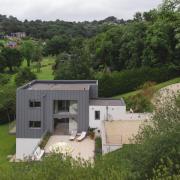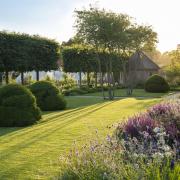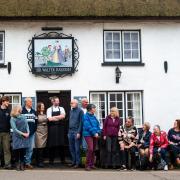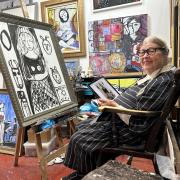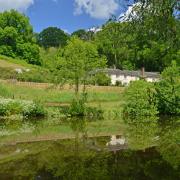A few years ago, Lucy Bell signed up for a ceramics evening class and was immediately hooked. At the time, she was looking for some headspace from the intense work she was doing as a support worker for people with mental health difficulties.
She wanted to do something to support her own mental health by finding breathing space and time out, so she started evening classes in Dartington. At first, her pots were – as she puts it – ‘terrible’, but she soon discovered that for her, it wasn’t the outcome that was important, it was the process of making.
After a while, she took out membership at a ceramics studio, which she attended two or three times a week. She had lots of practice and lots of failures. Then Covid came. The studio closed. But Lucy was completely focused on ceramics by this point. ‘I just wanted to do it all the time,’ she says.

In lockdown, Lucy was made redundant from one of her jobs and furloughed from her other one, so she had time on her hands. She bought a pottery wheel and dismantled her spare room to create a studio. Every day, she worked at the wheel, sometimes for three hours at a time. Suddenly, something just clicked. Now she could centre the clay perfectly on the wheel and everything was going smoothly. She was making pots regularly, and getting them fired in a friend’s kiln, dropping them off on the doorstep when meet-ups weren’t allowed.
‘I had cherished my time working with clay, but it had been shoehorned into my life whilst working two part-time jobs,’ she says. ‘During the pandemic, the balance slowly shifted. I set up a wheel in my spare room and covered the walls in plastic. This was to follow my passion for clay, but also to keep me sane during the hours of silence and isolation. I found the first lockdown extremely difficult, and I needed the clay as a focus, as a way to calm my overthinking mind and give me something to do.’
After lockdown, Lucy found a new studio and started selling her work at markets and craft fairs. She reduced the hours in her job, and then finally took the plunge and decided to focus full time on ceramics.

Lucy is a member of Devon Artist Network, which last year awarded her an Emerging Artist Bursary. The bursaries are aimed at those taking their first steps into professional arts practice, returning to the arts after a career break, or taking their creativity in a new direction.
She’s now making her own ceramics as well as teaching at The Clay Yard in Totnes and working for Landworks in Dartington. Landworks charity provides a supported route back into the community for people in prison or at risk of going to prison. As well as pottery, the work-based training includes woodwork and market gardening.
Lucy makes functional tableware as well as more experimental, decorative items which are fired outdoors in a barrel. To do this, she drills holes in the sides and base of the barrel, places the pots on a bed of sawdust and builds a fire on top. She places the lid on, then leaves the fire to burn for two or three hours while she waits to see what effects will be created.

The ‘barrels’ are oil drums which come from a local food supplier, and wood shavings from a nearby wood turner. Sustainability is an important element of Lucy’s studio practices, from recycling clay to her packaging choices.
For her barrel firing, she also uses organic materials such as seaweed, nutshells, banana skins and coffee grounds which create different colours and effects with the smoke.
‘The pots appear out of the smoke with these galaxy-like markings, and you never know what you’re going to get,’ says Lucy. ‘Each piece is unique – there’s not another pot in the entire world that’s the same. I really enjoy the alchemy of the process. I started out aiming for perfection. With an electric kiln, I know how a glaze will perform. Now, I want to let go of that control and make things which have more movement and energy about them.’

Lucy wants to explore these loose, organic techniques further, experimenting with different slips and clays that she finds and digs herself. She’s interested in the different colours, textures and effects created with clays from different locations.
A big part of her journey into ceramics is about supporting her own mental health and using pottery as a mindfulness practice.
‘Clay, for me, is the personification of mindfulness,’ says Lucy. ‘It allows for a single point of focus with no space for the critical mind. It envelops all of my senses, and demands attention. When working with clay, I am enchanted – everything else disappears, my worries and my inner critic soften and dissolve, and an acute ‘noticing’ arises. I am aware of how my mood affects what I produce, how my breath changes the structure of something or how the tension in my shoulders impacts the integrity of my work. Clay teaches me through embodiment and opens the gateway to creativity.’
lucybceramics.co.uk















